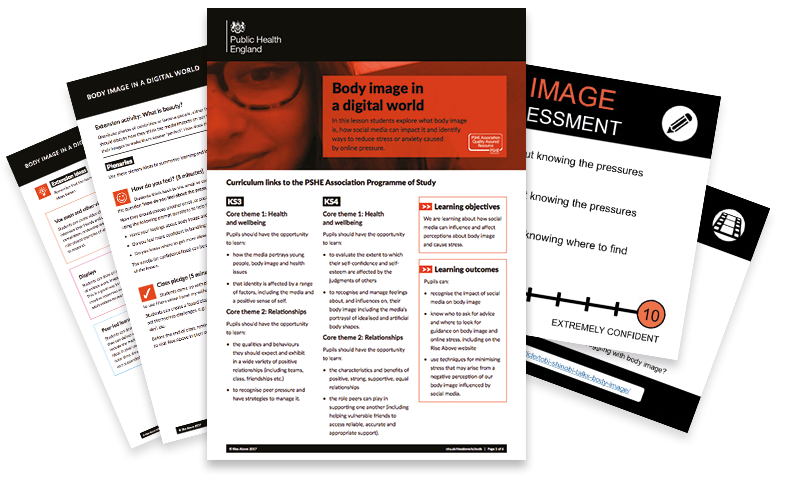Body Image - Key Stage 3 & 4

 The Dove Self-Esteem Project
The Dove Self-Esteem Project
About
Born in 2004, the Dove Self-Esteem Project combines work with leading experts with a vision of a world where positive body image equals positive self-esteem, and beauty is a source of confidence.
Since 2013, Dove has joined forces with leading authorities and partners to underpin their work in psychology, health and teen body image. From the World Association of Girl Guides and Girl Scouts (WAGGGS) to the Centre for Appearance Research (CAR) and the Women’s Dermatologic Society (WDS) – working together to empower young people and build body confidence around the world.
Dove's educational program is made to help parents, mentors, teachers and youth leaders better understand how to improve self-esteem of young people. Their resources include tools that are free to download and proven to build positive body confidence.
Click here to see how you can get involved.
Resources
Teach your pupils important strategies to protect and build self-confidence with the Confident Me programme. Confident Me is helping secondary school teachers meet national curriculum objectives in statutory health education, PSHE, health & wellbeing, and literacy across learning.
The programme includes:
Confident Me (5-lesson-pack)
Five x 50-minute lessons on appearance ideals, media messages, body comparisons, body talk and how to become a body confidence champion.
Confident Me (single lesson)
One x 50-minute lesson on appearance pressures, body comparisons, challenging appearance ideals and building body confidence. The single lesson includes one teacher guide with a plan for the session, one PPT slide deck and worksheets.
My Hair, My Crown (single lesson)
A 2-hour session exploring hair beauty stereotypes
Proud To Be Me (single lesson)
A 2-hour session on the impact appearance norms and ideals have on the LGBTQ+ community (Proud To Be Me).
All resources can be delivered flexibly within health education lessons, during tutor time or even as part of an assembly. Each lesson includes a teacher guide with a lesson plan, PPT slide deck, videos and activity sheets.
Click here to register for the resources.
Dove have also produced training videos for teachers to support the delivery of the Confident Me workshop, which include:
- Introduction to body confidence
- Workshop lesson plan & material
- Workshop content overview
- How to create the right environment
- When to adapt the lesson plan
- Tips for challenging questions
'Be Real' Body Confidence Campaign and Resources
![]() Campaigning to chance attitudes to body image and help all of us put health above appearance and be confident in our bodies.
Campaigning to chance attitudes to body image and help all of us put health above appearance and be confident in our bodies.
Body Image and Advertising
Teaching resources and lesson plans on body image by MediaSmart. The website also provides pages for young people, supporters, parents and careres.
Media Smart Body Image and Advertising - Teachers' Notes
Compilation of TV adverts on MediaSmart UK's YouTube playlist
If you wish to use the case studies, please ensure that your school or educational institution has a valid Educational Recording Agency licence.
Body Image in a Digital World
Encourage students to explore what body image is, how social media can impact it and ways to reduce stress or anxiety caused by online pressures.

Using peer-to-peer discussion and activities, students discuss the impact of social media on body image and identify techniques for minimising stress that may arise from negative body image.
Lesson plan includes:
-
Accompanying PowerPoint for use in class
-
Starter activities – carry out a baseline assessment of students' prior knowledge, skills and understanding
-
Core peer-to-peer activities, plenaries and exciting extension ideas
-
2 films to support the activities – one featuring opinions from students and another featuring photographer and Instagrammer Tobi Shinobi
View and download the KS3-KS4 lesson plan.
Eating Disorders - Advice for Teachers from the PSHE Association
 Many people who experience eating disorders develop them during adolescence or even earlier. This means you may have a pupil in your class who currently has an eating disorder, or who may develop one in future. By talking about eating disorders in a PSHE lesson, you can both help pupils to recognise the signs of disordered eating, and encourage them to seek help.
Many people who experience eating disorders develop them during adolescence or even earlier. This means you may have a pupil in your class who currently has an eating disorder, or who may develop one in future. By talking about eating disorders in a PSHE lesson, you can both help pupils to recognise the signs of disordered eating, and encourage them to seek help.
There are a number of steps you can take to make sure that you teach about eating disorders in a way which is safe for pupils who may be at risk of developing an eating disorder or already suffer from one. There are a few things that you need to be aware of to ensure your pupils’ wellbeing. This resources may help you do so:
Supporting Pupils with an Eating Disorder to Seek Help
Lessons on eating disorders should aim to encourage pupils to seek help and signpost them to ways of doing so. This increases the chances of a pupil disclosing an eating disorder to a member of staff, and you’ll need to be ready to manage the situation. These resources should help you to do so:
Teachers can make a real difference to the lives of pupils who are suffering from an eating disorder, helping them on the road to recovery, by supporting friends or those who are at risk.
Educator Toolkit on Eating Disorders
An eating disorder themed toolkit for educators by the National Eating Disorder Association.
View and download the toolkit here.
Key Standards in Teaching About Body Image
Teacher Guidance by the PSHE Association for effective teaching and learning about body image.
Male Body Image
Media Smart and First News have come together to create the Boys’ Biggest Conversation – a campaign to encourage young men, across the UK, to talk about body image and the effect it has on their mental wellbeing.
Although the resource focuses on the representation of men in the media, it is designed for use with students aged 11–14 years of all genders, aiming to broaden the discussion and build understanding of how this issue can affect everyone.
Download the resources here.
'Naked Beach' Body Image Resources for Schools
View and download the lesson plans here.
Newsround Programme on Body Image
Being Me the programme by Newsround explores what children and young people think about their own body image.
Articles of Interest
Guide to What A 'Normal' Vulva Looks Like - BBC News
Teenage girls are being directed to a new online reference tool that helps them check if their vulva looks normal. Available on the sexual health charity Brook website, the resource gives visual examples and advice on how female genitals change in puberty.
Jamie Oliver Bans Daughter, 14, from Posting Selfies
TV chef Jamie Oliver has said he has banned his 14-year-old daughter from sharing selfies, describing them as the unhealthy "sugar of social media". "We ban Daisy from doing selfies and mainly she doesn't, but a couple slip up," the father-of-five told the Lifestyle News hound. Oliver, 42, says he is among the first generation of parents learning to deal with children sharing photos online. He and wife Jools regularly post family photos on their own Instagram pages. But Oliver, a prominent campaigner for healthy eating, described teenage girls' use of Instagram as "frightening".
Unilever to Use 'Less Sexist' Ads
Adverts showing women unable to resist the lure of chocolate, slaving in the kitchen and going giggly at the sight of a man will be no more if consumer goods giant Unilever has its way. The firm, behind more than 400 brands from Ben & Jerry's ice-cream to Dove soap, has pledged to remove sexist stereotypes from its own ads and called on rivals to follow suit.
What the 'Perfect' Body Looks Like in 18 Different Countries
Female graphic designers from around the world were given the same photo and asked to tweak the image so that the model met the beauty standards of their country. "The goal of this project is to better understand potentially unrealistic standards of beauty and to see how such pressures vary around the world.”
Tagged under: body image, cancer, self esteem, media, hate crime, Key Stage 3, Key Stage 4, female health, physical health and wellbeing
Was the information on this page helpful? 


